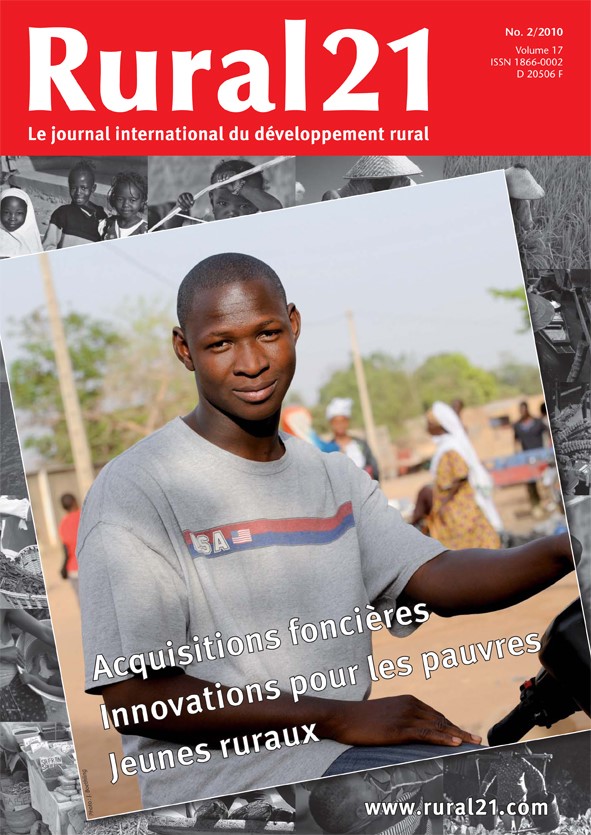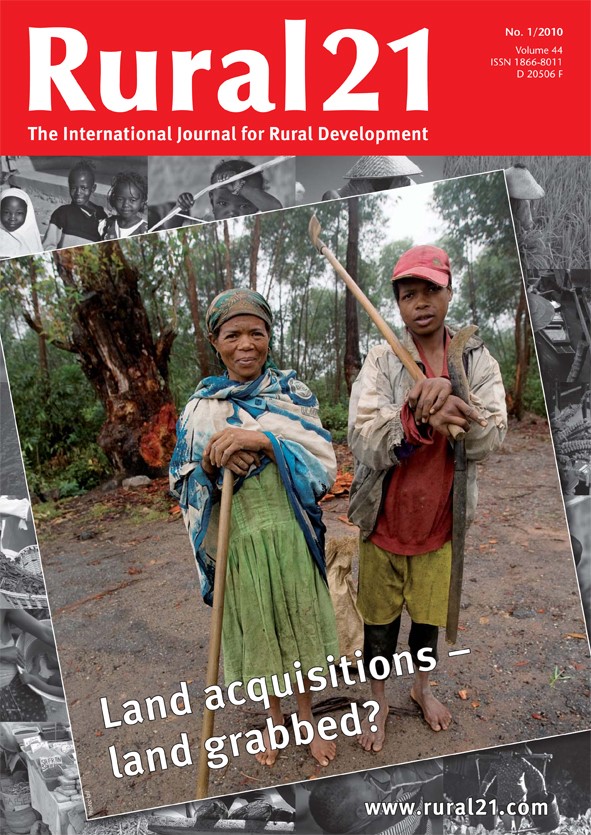Location
The international journal Rural 21 has dedicated more than 40 years to all topics surrounding rural development. Its ambition is to further those strategies and policies that strengthen rural areas of developing and newly industrialising countries and encourage their implementation. The journal addresses the complete range of relevant themes – from agriculture and fisheries via capacity building and education through to health and social security, energy supply and trade. Center-stage is always devoted to inquiring into how measures and strategies can contribute to global food security and to reducing poverty.
Rural 21 desires to further the dialogue between science and politics, the private sector, civil society and practitioners. Two platforms are designed for this purpose: Rural 21 in print is published four times a year, each issue highlighting a specific focus of rural development – this print edition is read in more than 150 countries. In parallel, Rural 21 online keeps the rural development community up to date on news and events, scientific findings and other print and online publications.
Rural 21 is published by DLG-Verlag GmbH in Frankfurt/Germany. Financial partners are BMZ (German Federal Ministry for Economic Cooperation and Development), GIZ (Deutsche Gesellschaft für Internationale Zusammenarbeit), DLG (German Agricultural Society – Deutsche Landwirtschaft-Gesellschaft), SDC (Swiss Agency for Development and Cooperation) and Helvetas Swiss Intercooperation.
The first issue of Rural 21 dates back to 1968. From 1974 to 2007, the journal was published in three languages entitled "entwicklung & ländlicher raum" / "agriculture & rural development" / "agriculture & développement rural". In 2008, the journal was relaunched as "Rural 21".
Members:
Resources
Displaying 226 - 230 of 319La crise a atteint les populations les plus pauvres de la planète
Contrairement à l'idée reçue que la crise alimentaire de 2007-2008 et la crise économique mondiale n'auraient rien à voir l'une avec l'autre, cet article montre que les deux événements sont dus à des causes macroéconomiques comparables. Il montre en outre que les conséquences de ces deux phénomènes ont des effets cumulatifs qui atteignent les personnes les plus pauvres parmi les pauvres dont la plupart vivent dans les zones rurales des pays en développement ?
La gestion intégrée de l'eau par bassin versant
Les ressources en eau et en terres s'amenuisent de plus en plus et répondent difficilement aux exigences alimentaires d'une population mondiale croissante. Dans les pays en développement des régions tropicales en particulier, la variabilité des conditions météorologiques associée à la productivité généralement basse de l'agriculture de subsistance représente une menace pour les sociétés rurales vulnérables ; l'accès à des équipements d'infrastructure et aux ressources naturelles devient de jour en jour plus difficile.
"Land grabs" in Africa: Pathways, trends and the role of legal contracts
Large land acquisitions can have a deep, lasting e? ect on livelihoods, food security and the future of agriculture, so there is a need for strategic thinking, vigorous public debate and government responsiveness to public concerns, especially in recipient countries
Rethinking rural and agricultural finance - The African case
In order to boost agricultural growth in SSA, further investment in the agricultural sector is urgently needed. The mark-up of ODA funds is a stepping-stone in this regard. However, ODA should function as a catalyst for further private investments and should be used to assist recipient governments in building the institutional framework for attracting private investment and promoting balanced growth. Important success factors include further advances in improving domestic banking and agricultural risk management systems.
The rush for farmland
Since the 2008 food price crisis, foreign investors have been acquiring more and more land in poor countries for producing foodstuffs and biofuels for their own use. Such investments have the potential to promote rural development and food security worldwide. By the same token, however, there is the danger of countless small farmers losing their land, of food insecurity increasing in many places, and of social and ecological systems collapsing through pure "land grabbing".



